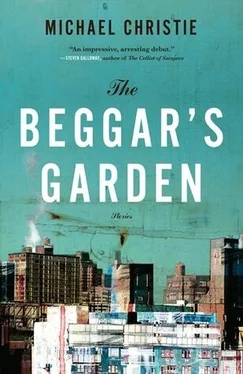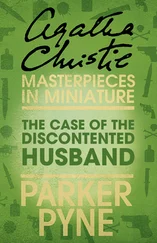Sam sustained the interlude of silence that the story seemed to require. “He would have been arrested if he gave himself up. Am I right?” he said.
“I suppose. Wouldn’t have been much of a charge, just trespassing maybe, would’ve caught a beating from the sailors is more likely. But the meaning here is two things: sometimes a gift ain’t a gift, and sometimes people are just too iron-headed to go asking for help.” The beggar waved a blackened hand over his change cup like a tiny magician’s top hat. “Me? I’m not afflicted with that problem.”
At this, Sam thanked the man, dug into his pocket, and dumped the rest of his change, a near handful, into the cup.
As he started away something occurred to him, and he turned back.
“Take some out,” Sam said.
“What’s that?”
“There are too many coins in there — it doesn’t bother me, but people won’t give because they’ll think you don’t need it. But don’t take them all out, because people won’t give to someone who no one else gives to — the same way people don’t want to go to an empty restaurant.”
The man bloomed a sly, craggy smile that looked to be carved out of margarine. “You think I don’t know that?” he said, and scooped a handful of coins and began stuffing them deep in the pocket of his pungent coat.
Sam woke to the sound of a shopping cart buzzing up the alley, which was now lit by a yellow array of moth-shrouded streetlights. He ordered a pizza and met the deliveryman on the front steps of his darkened house. When Sam handed him a twenty, the deliveryman commenced his attempt to retrieve the change from the pocket of his punishingly tight jeans. Sam waited five long seconds and the man hadn’t yet got a finger in.
“Keep it. You earned it,” Sam said, and the deliveryman gave up, grinning.
Back in his drafty abode, Sam thought of the old panhandler. He had liked him, his lack of pretence. It seemed to follow logically that someone with nothing left would also have nothing left to hide. It delighted him to think that his advice had helped him, even if only modestly. He’d also liked the easy way he spoke. His co-workers rarely told stories so freely, or of that nature — concerning the tragic events that so often befell a human being — and the ones they did tell, Sam always found trivial and hard to relate to. Not that he could truthfully say he found anything personally relevant in the strange tale of a broken, stubborn man freezing to death on a ship; in fact he’d found the story puzzling. Most puzzling of all was how the panhandler came to know the story if the man had died. Yet it had moved him.
While he ate, Sam pictured the beggar wandering the roadside shoulders of Sam’s old hometown. It was easy to imagine him there — easier than it was to see himself there any longer. There, fallen men like the beggar parked themselves in the tavern to tell woeful stories and drink away their disability cheques, while above the sun fenced with a few unfortunate dollops of cloud in the giant sky. Outright begging was not something that was done, not even on the reserves. Sam supposed that street begging required the anonymity of a big city; otherwise, in a small town like his, what another gave could only be thought of as borrowed. Those who could not work or for whom there was no work were regarded with a solemnity by men like his father, who’d hired countless dazed-looking men for menial jobs around their house.
Sam grew up with no siblings and his parents were now both long deceased, his mother when he was six, his father when he was twenty-one — this while he was out east at Queen’s University. His father was an accountant who’d made his living filing returns for the various Indian bands outside their rural Manitoba town. He was a precise and generous man who detested error, most vehemently his own, and provided his services to the bands at deep discount. Few others would do the same, as he never failed to point out whenever, out of adolescent loneliness, the young Sam voiced his desire to move to Winnipeg.
“These people need me,” he’d say. “They don’t know their asses from tea kettles.”
Sam had grown up privileged, at least in relation to his peers, mostly the sons of wheat farmers, mechanics, and RCMP highway patrolmen, and had never been subject to the small-town inertia that had cemented their fates. Sam had coasted through high school with the coy detachment of a partygoer making a brief appearance before leaving for a more interesting and better-attended function. His eventual enrolment in university had been a resolute fact that had roots in a time beyond his recall, a certainty as closed to discussion as the subject of his mother, who’d died from a botched medical procedure and about whom Sam had never heard his father manage more than a couple of sentences.
But at university Sam had his first glimpse of the iridescent sort of person only real wealth could mint. And Anna was the best of them. They’d met in a second-year microeconomics class. That same year, Sam’s father was killed by a stroke and Sam stuffed Anna into the resulting void. They spent every minute they could together. At first Sam was disconcerted by how easily she described her untroubled ascendance through childhood and into the clever and joyful woman she’d become. As Sam came to know her, he decided that hardship, economic or otherwise, did not bestow character, that in fact the opposite was usually true.
Her parents and three sisters had greeted him with a cautious, incremental warming. Her mother was a self-described homemaker and her father was an engineer who’d made a king’s fortune in the eighties by buying up drained Albertan oil wells and using a method he’d innovated to wring from them a few more thousand barrels of crude. They lived in a rustic log mansion at the heart of a rolling plot of ranchland and engaged in an intricate schedule of family vacations, retreats, and holidays to which Sam had always felt not entirely welcome. The thought of Anna winding herself and Cricket back into their lives made him ill.
Before descending again to an unsteady slumber, Sam recalled his car parked in a garage downtown, no doubt accruing a book of tickets. Though he and Anna were wealthy by most measures, a fear of poverty persisted deep in him — this being perhaps a legacy of his father — and at the bank he often felt guilty and fraudulent to be in receipt of such a generous salary. Despite their considerable savings, he couldn’t shake the notion that he was just a few paycheques away from being stripped of all he held dear. That’s what money’s for, Sam assured himself about the tickets, now aware that tomorrow he’d have to wear the same suit, the one he hadn’t felt the urge to remove before bed.
The next afternoon, Sam found the old panhandler in the same spot and held out to him a large slab of cardboard. The old man extended a grimy palm and took it.
“What in the hell is this?” he said.
Sam had spent that morning at his desk pondering the old panhandler’s sign, the connotations of it, its brief, penitent request for alms, its assurance of sobriety, and its parting block-letter invocation of God’s blessing. While unread messages simmered in his inbox and his phone rang until losing its charge, Sam had become convinced that the sign could be improved.
He rode the service elevator down to the loading dock at the rear of the bank tower and fished out a cardboard box from the recycling bin. He took a marker and inscribed it with his message, then lightly charred the edges of the sign like a pirate’s map he’d once made for Cricket after burying her birthday present in a bed of kale in Anna’s vegetable garden.
New to vancuver. Spare Chanje for food and medecine? Thanks.
Читать дальше












